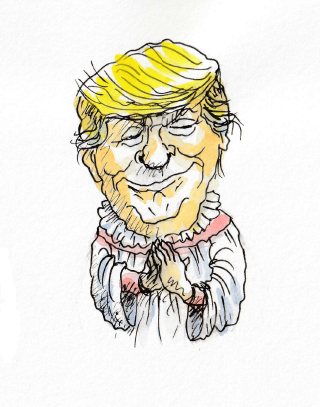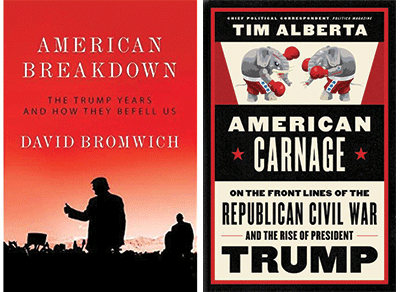American Breakdown by David Bromwich
American Carnage by Tim Alberta
As the Trump presidency careens forwards like an out-of-control cement mixer, there is the sense that anything can happen. As David Bromwich puts it, it is ‘government by frenzy’, like the White House taken over by the creators of the South Park cartoon.
Much of what we see, though, fits what we knew of Trump’s personality, and the dubious dealings that are becoming clearer each day have a certain inevitability about them. Nothing should surprise us, unless Trump suddenly began governing with diligence, wisdom, dignity, kindness and humility. (It seems unlikely.)
What’s more puzzling than his behaviour remains how on earth America, and by extension the world, got to where we are. Tim Alberta, a Republican, but a seemingly moderate one, and a journalist, attempts to answer this by going right back to Dubbya Bush, the collapse of the Right’s power after Obama’s election, and the subsequent clawing back, fuelled partly by resentment that a black man made it to the top job.
Alberta goes into more detail than perhaps non-US citizens and non-political junkies understand or need to know, but he recalls the rise of the Tea Party, which destroyed ‘civility’ in US politics and which one Republican described as weirder than anything Shakespeare could dream up, and crackpots such as Sarah Palin and Ted Cruz. Regarding the 2016 election, Alberta tries to explain why as Trump repeatedly offended, support for him continued to rise. It’s a story of increasing craziness, and Alberta views him as an outlier and aberration, but his divisiveness, selfishness and demonising of the marginalised taps into core Republican values, more than Alberta will admit. In a weird echo of Obama, but for a different audience – Republican voters – Trump explained, ‘I gave them hope’.

Christian support of Trump is a sad element in all this. Alberta describes Jerry Falwell pledging his support while standing in front of a framed Playboy magazine cover in Trump’s penthouse. The New York Review of Books recently shed some light on this, explaining that Christians are well aware of Trump’s faults, but many think God is using Trump for higher purposes. Alberta describes the relationship between Trump and evangelicals as simply ‘transactional’. But how fair the deal is, remains to be seen. Doing deals with Trump usually just benefits Trump.
David Bromwich, in his much shorter book (with less reportage and more analysis), finds problems bigger than Trump or the Republican Party. He sees Bush and Cheney’s War on Terror being continued by Obama, while neither side does anything about the widening gulfs in American society. Alberta and Bromwich both agree – Obama was good at talking but not so good at putting into practice. Bromwich goes further back, to Reagan and Clinton, blaming them for the erosion of rights and heightened individualism, which opened a door for Trump to stick a foot in.
Bromwich looks to the founding fathers and Lincoln for alternative role models, which is always his strength, but it might be a weakness too because maybe that’s not wide enough. Maybe part of the problem lies in America’s elevated sense of itself, as exceptional, as a city on a hill. Australians are far more cynical (realistic?) about political power, those who hold it and those who support them. A TV celebrity with no morals sowing discord and winning political office by doing so shouldn’t come as much of a surprise to us.
Nick Mattiske blogs on books at coburgreviewofbooks.wordpress.com













